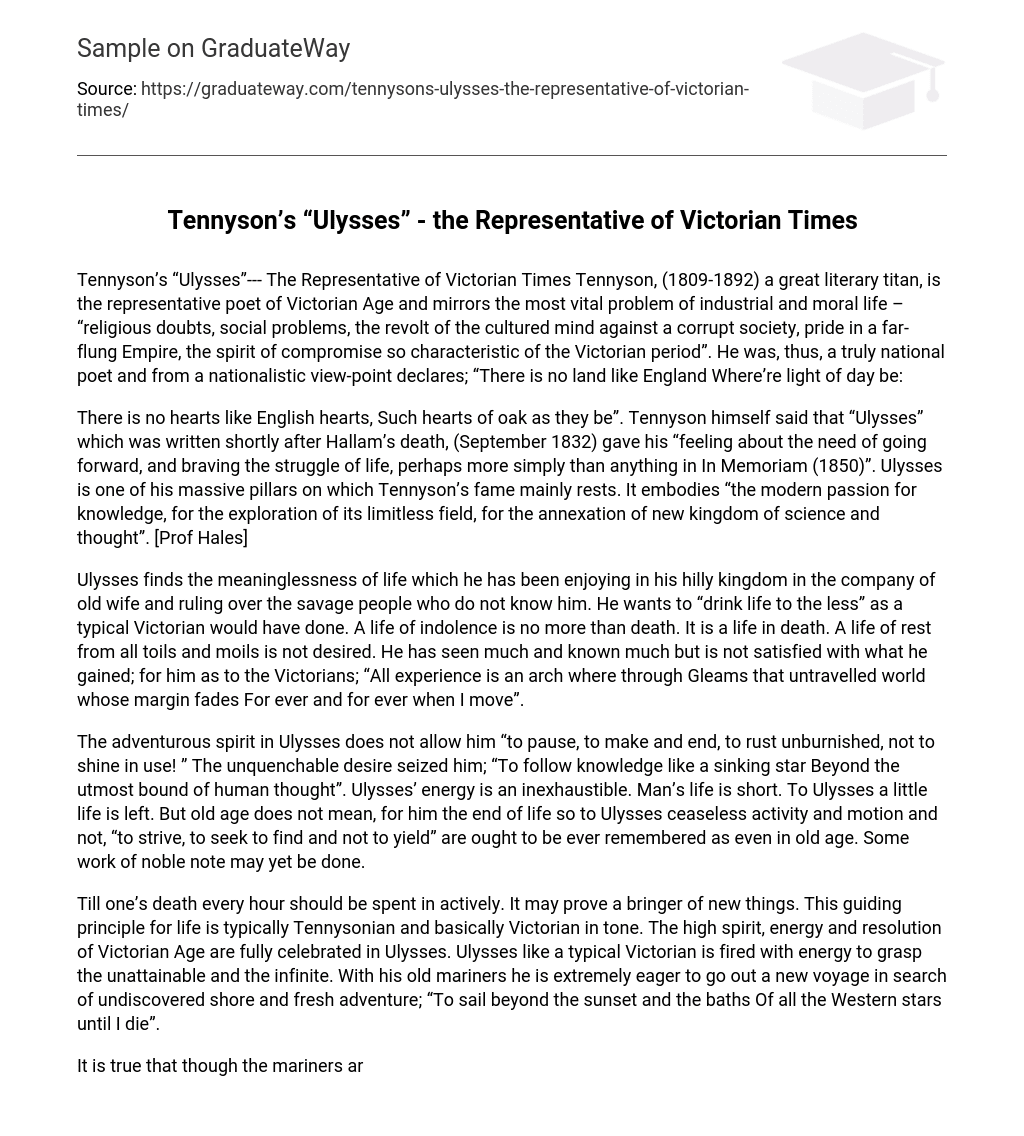Tennyson’s “Ulysses”— The Representative of Victorian Times Tennyson, (1809-1892) a great literary titan, is the representative poet of Victorian Age and mirrors the most vital problem of industrial and moral life – “religious doubts, social problems, the revolt of the cultured mind against a corrupt society, pride in a far-flung Empire, the spirit of compromise so characteristic of the Victorian period”. He was, thus, a truly national poet and from a nationalistic view-point declares; “There is no land like England Where’re light of day be:
There is no hearts like English hearts, Such hearts of oak as they be”. Tennyson himself said that “Ulysses” which was written shortly after Hallam’s death, (September 1832) gave his “feeling about the need of going forward, and braving the struggle of life, perhaps more simply than anything in In Memoriam (1850)”. Ulysses is one of his massive pillars on which Tennyson’s fame mainly rests. It embodies “the modern passion for knowledge, for the exploration of its limitless field, for the annexation of new kingdom of science and thought”. [Prof Hales]
Ulysses finds the meaninglessness of life which he has been enjoying in his hilly kingdom in the company of old wife and ruling over the savage people who do not know him. He wants to “drink life to the less” as a typical Victorian would have done. A life of indolence is no more than death. It is a life in death. A life of rest from all toils and moils is not desired. He has seen much and known much but is not satisfied with what he gained; for him as to the Victorians; “All experience is an arch where through Gleams that untravelled world whose margin fades For ever and for ever when I move”.
The adventurous spirit in Ulysses does not allow him “to pause, to make and end, to rust unburnished, not to shine in use! ” The unquenchable desire seized him; “To follow knowledge like a sinking star Beyond the utmost bound of human thought”. Ulysses’ energy is an inexhaustible. Man’s life is short. To Ulysses a little life is left. But old age does not mean, for him the end of life so to Ulysses ceaseless activity and motion and not, “to strive, to seek to find and not to yield” are ought to be ever remembered as even in old age. Some work of noble note may yet be done.
Till one’s death every hour should be spent in actively. It may prove a bringer of new things. This guiding principle for life is typically Tennysonian and basically Victorian in tone. The high spirit, energy and resolution of Victorian Age are fully celebrated in Ulysses. Ulysses like a typical Victorian is fired with energy to grasp the unattainable and the infinite. With his old mariners he is extremely eager to go out a new voyage in search of undiscovered shore and fresh adventure; “To sail beyond the sunset and the baths Of all the Western stars until I die”.
It is true that though the mariners are not in full strength of young’s, though they are “made week by time and fate” but they have the will and the determination to touch the untouchable. Some ways of Hellenic life come into focus light in “Ulysses”. Household deities were worshiped in proper care and attention. The failure to adore them was a great moral lapse. Ulysses praised his son for his praying “meet adoration to my household gods”. “Ulysses” is not devoid of word picturing.
The brilliant picture of evening landscape of Ithaca can be visualized through these lines; “The light being twinkle from the rock; The long day wanes; the slow moon climbs; the deep Moans round with many voices”. Thus Tennyson’s “Ulysses” is a superb creation of artistic excellence. With Keatsian pictorial quality, his astonishing command of musical resources of language is blended so accurately that it becomes a landmark in English literature.
It expresses the philosophy of the poet as well as the energy and resolution of his age. Stop ford A. Brooke aptly remarks about Tennyson as a representative poet of his age: “His age was vividly with him, and he wrote of patriotism, of the proper conception of freedom, of the sad condition of the poor, of the woman’s position in the onward movement of the world, of the place of commerce and science in that movement, of war as the remedy of selfishness and evils of commerce and of future race”.





